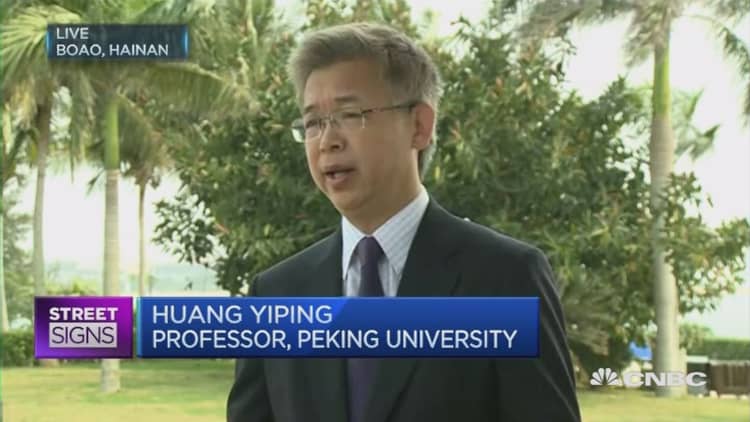
A weaker renminbi, or yuan won't necessarily lift China's sagging economic growth rates, contrary to market expectations, warned an advisor to the People's Bank of China monetary policy committee.
"Looking at the impact on growth, we used to think it [a depreciating renminbi] could boost exports, but the story has become a lot more complicated," said Huang Yiping on the sidelines of the Boao Forum for Asia on Wednesday.
Because the country imports many of the building blocks of its exports via a global supply chain network, a depreciating renminbi could have mixed consequences for exporters, said Huang, who is also an economics professor at Peking University.
At the same time, any effect on exports could also be delayed as a result of the J-curve effect, he added, referring to a situation where a country's trade balance initially worsens following currency depreciation.
Beyond trade, a falling renminbi also has other negative implications for the mainland.
"The economy is very open so when you weaken the currency, you have a little boost to exports but you have an immediate impact on capital outflows and portfolio positions," Huang said. "I'm not sure if you weaken the currency today, it will deliver a positive impact on growth."
Concerns about fund outflows have been on the rise, with analysts pointing to the mainland's shrinking pile of foreign-exchange reserves amid policymakers' recent efforts to prop up the yuan's value. Reserves totaled $3.20 trillion at the end of February, dropping from $3.23 trillion the previous month. That followed $100 billion per month in average currency outflows during November, December and January.
Major players, including Rabobank's global head of financial markets research and storied hedge fund manager Kyle Bass, are betting that Beijing will engineer further declines this year after last August's surprise 2 percent depreciation.
After hitting a 2016 high against the dollar on Friday, the renminbi has swung back to modest losses this week.
Huang's comments echo sentiments previously expressed by state officials in an attempt to curb market speculation of yuan weakness.
Premier Li recently assured International Monetary Fund chief Christine Lagarde that Beijing wasn't interested in further devaluation, adding that he wants the currency "basically stable at a reasonable level."
Huang repeated that the PBOC will "probably" unleash further monetary stimulus if growth continues to stall, but warned any future actions will be based on economic data.
He believes China's gross domestic product (GDP) target of 6.5 to 7 percent growth is achievable with policy support on the monetary and fiscal fronts.



